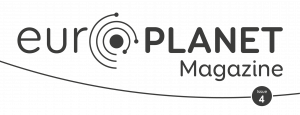From Online to Granada: Bringing Scientific Conferences to Schools
Ulysse Pedreira-Segade, Education Officer for Europlanet 2024 RI and Scientific Coordinator for Lecturers Without Borders, describes how activities to bring planetary sciences to the classroom has transitioned from online to in-person.
Read article in the fully formatted PDF of the Europlanet Magazine.
It is late September 2022 in Granada, Spain. The long-awaited, in-person Europlanet Science Congress (EPSC) week is going well: professional researchers are communicating results in planetary science during numerous parallel sessions, press conferences are opening up these results to the media, and fascinating keynote lectures enable the community to reflect upon past achievements and new goals. It is also a week of experiments in outreach and education for Europlanet and its partner, Lecturers Without Borders (LeWiBo), who are bringing the third edition of EPSC Goes Live for Schools to classrooms in Andalucía.
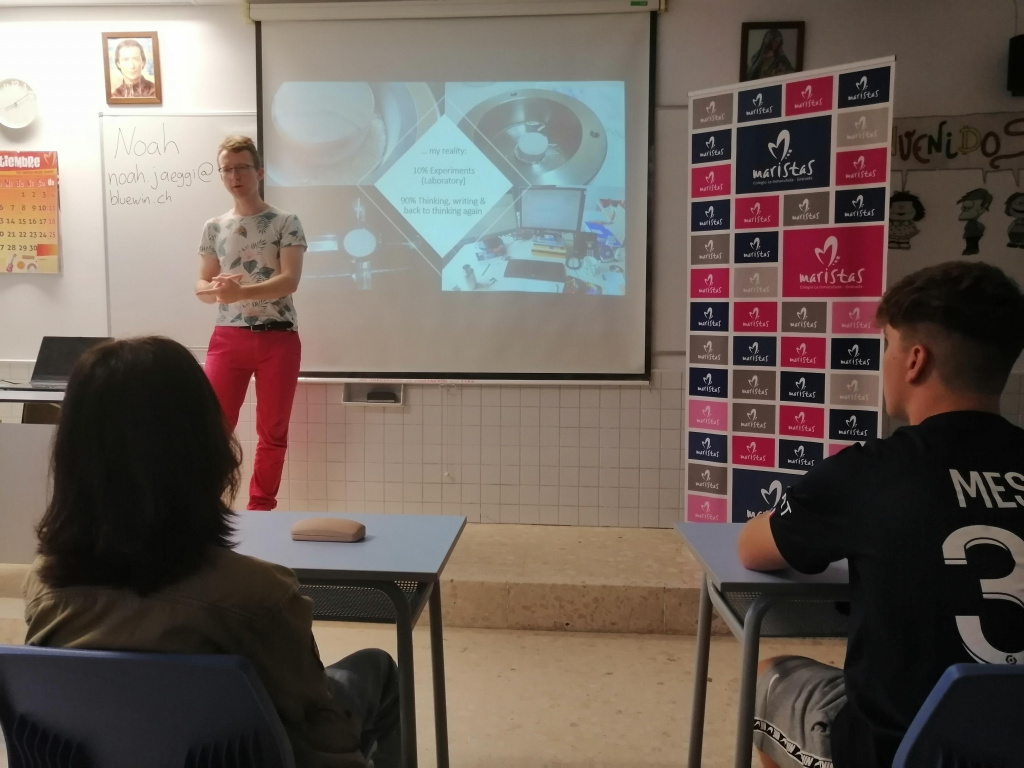
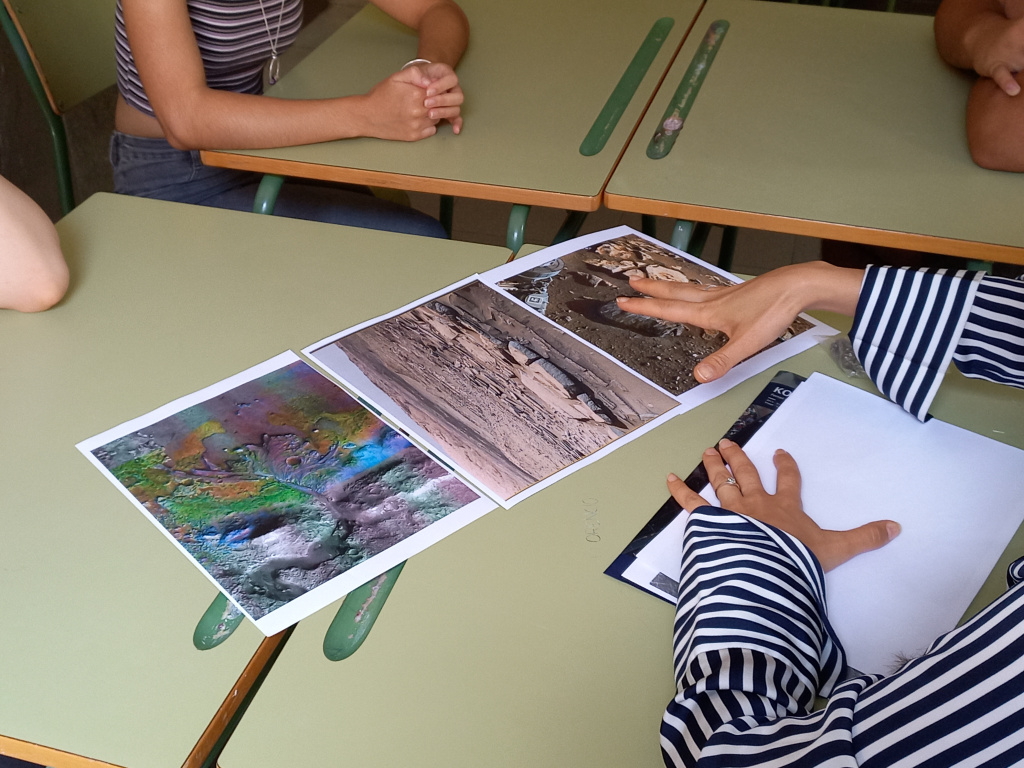
EPSC was originally supposed to be held in Granada in September 2020. However, the pandemic changed the rules of meetings – like so many other things – and the congress was held online. LeWiBo had a similar struggle: designed to organise visits to schools by travelling scientists, even local outreach activities became impossible during the height of the pandemic. As EPSC was moved online, a collaboration was born: LeWiBo crafted a programme of online outreach talks so that, if scientists could not go to schools, then maybe schools could join the virtual conference.
A Window into Science
The first EPSC Goes Live for Schools, also supported by Scientix and Frontiers in Science along with the Europlanet Diversity Committee and EPEC early career network, was a great success. Key ingredients included a demand for online educational content, the public’s passion for planetary science, the motivation of teachers to try new things, and the enthusiasm of scientists to participate in educational activities in a time of mistrust for science.
A large range of experiences were offered to the students who joined the event with their teachers. The complete programme comprised six live-streamed and recorded lectures (via Zoom and YouTube), 13 on-demand scientific talks with plain-language summaries, a Q&A with teachers, an art contest, and a dedicated Slack channel for questions and conversation. For 16 days, the event brought together more than 20 scientists and 114 schools from 28 different countries. EPSC Goes Live for Schools adopted a new approach to showcase how science is made: students and teachers could watch recordings of real scientific talks and were able to use educational resources to discuss the structure, purpose, and content of professional scientific communications. The live webinars and the Slack channel offered an opportunity to engage directly with researchers. Participating scientists also found that revealing the reality of life in research to the views, knowledge and interests of the public could be challenging and enriching.
At the time, I was a researcher in astrobiology and living in New York State, which was hit very hard by Covid-19. My lab was closed from March to September 2020. As I slowly went back to my experiments, volunteering some time to help with campus-wide PCR testing at my institute, I was invited to share the floor with another scientist at the first edition of EPSC Goes Live for Schools and talk about astrobiology. A few months later, I decided to leave academia as a researcher and focus on a career in outreach and education. I wanted to help build a better society through education, action, trust, inclusiveness and cultural exchanges. I stayed in touch with LeWiBo, which in August 2021 offered me a position to coordinate the next EPSC Goes Live for Schools. As EPSC was again virtual, the second edition of the outreach satellite event was again planned online.
Building on the past format of the event and considering feedback from teachers, students and scientists, we focused on inclusivity and interactivity by adding new sessions of simple Q&A discussions in several languages. Although science is shared in English by the professional research community around the world, education and outreach activities need to encompass the diversity of cultures and languages to promote dialogue between scientists and the audience. The programme innovated from the first iteration to include three live-streamed and recorded lectures, one Q&A session for teachers, 13 Q&A sessions for students (held in five different languages), and on-demand resources.
Overall, 51 schools from 15 countries joined the month-long event. We also invited scientists from the Europlanet community to contribute to Europlanet’s wider education and outreach programme by helping translate our Mars astrobiology resources (available now in French, Portuguese, Spanish, Italian and Greek).
Finally, this year, the third EPSC Goes Live for Schools took place in Granada. As everyone was itching to get back to in-person meetings, we hoped to take advantage of that enthusiasm and organise local school visits. The Local Organising Committee (LOC) was extremely helpful in connecting us with schools and teachers to try to understand the needs, timeline, and interests of the targeted audience. In total, 20 scientists participating in EPSC visited six schools in and around Granada.
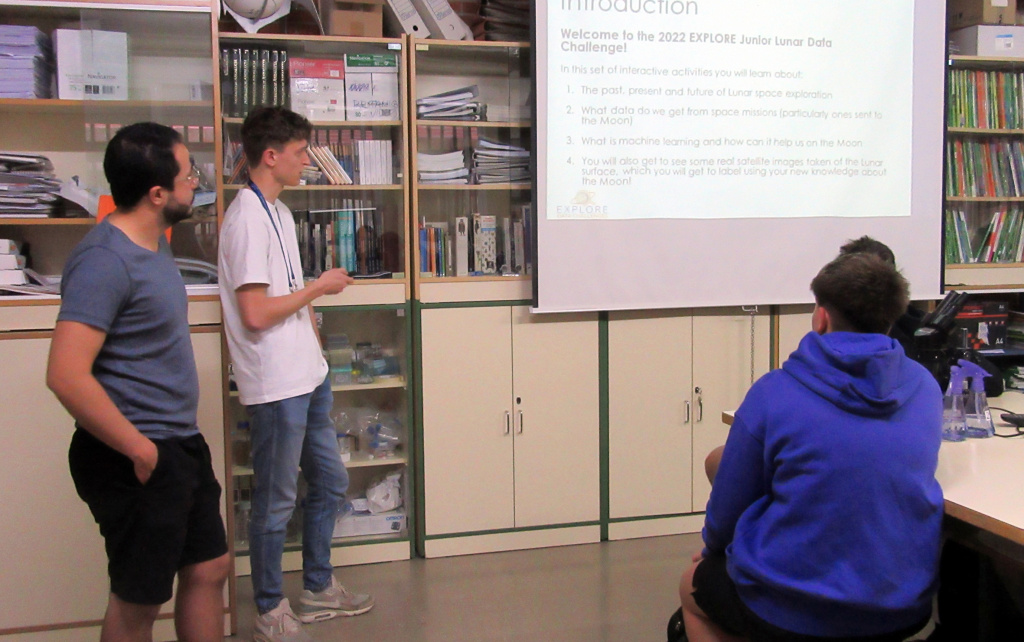
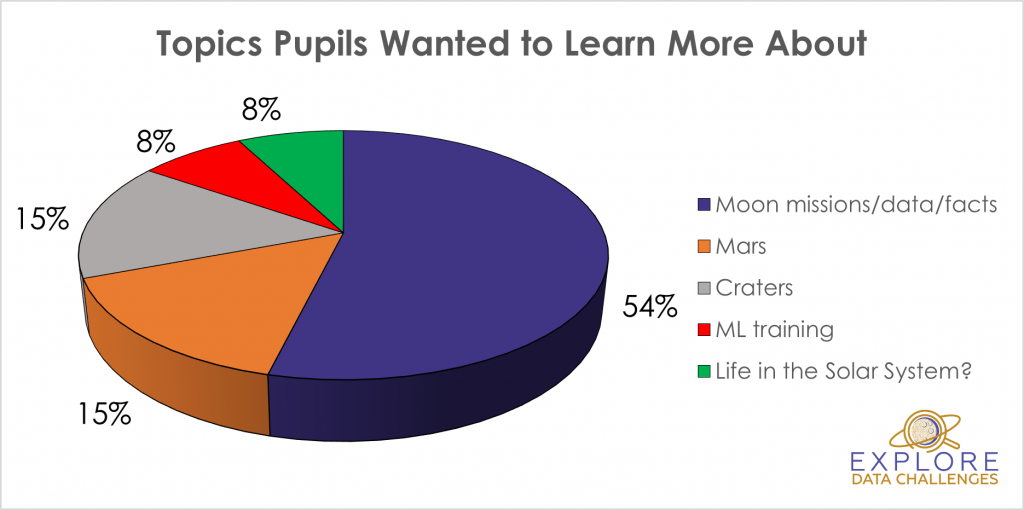
Lessons Learned
I would like to share a few highlights and lessons learned with you. Although you might not coordinate an outreach event anytime soon, I hope these thoughts might help you appreciate such events more and maybe encourage you to participate in one (if you have not already).
- As a coordinator for outreach events, start early: your audience and invited participants have their own timelines and schedules (e.g. the summer is a difficult time to contact teachers and scientists), so engaging them as early as possible is key to success.
- Free activities based on voluntary participation of scientists does not mean lowering the bar on quality and inclusivity. Craft an adaptable outreach programme that can be included within constraints (time, location, schedule of a conference etc) and with minimal effort. Scientists and schools are genuinely interested in participating in such events and will find the time to take part even if their schedules are tough to work around.
- Offer freedom to participants, but make sure to include clear guidelines and a “standard” activity. Although some scientists and teachers might have a pretty good idea of the kind of activity they would like to give/host, most would prefer to trust the coordinator to craft a well-thought-out programme.
- Language is a barrier: we could only work with schools with a bilingual programme or scientists speaking Spanish. This greatly limited the number of visits we could coordinate. As a scientist, if you do speak several languages, make sure to use them in your outreach practices to reach a more diverse audience.
- There are many ways to help lower barriers for non-native English speakers: speaking slowly, adding more text to presentations, having the English teacher present, and including captions can greatly enhance the experience for the audience and the speaker. If sharing pre-talk material, offer to help translate it with the teacher.
- Make the most of the visit! Teachers: if possible, organise tours of the school and schedule the visit so that as many students as possible can join, voluntarily if possible. If you would like the scientists to spend more time at your school, ask them! Scientists: the visit is an exchange, not a unidirectional lesson you are giving. Take some time to reflect on your practices, your own work and your connections with your audience and society. Make sure to leave ample time for questions. If you want to spend longer at the school, ask if it would be possible.
- A key finding: visiting a school can be an amazing experience, both for the scientist and the classroom. There is power and motivation in such exchanges that can have a lasting impact on both sides.
The third edition of EPSC Goes Live for Schools also included an online component from mid-October to mid-November. This time, we focused on a simple programme of live-streams and recorded lectures for 40 schools. Everything was available free for later viewing on LeWiBo’s YouTube channel.
Looking Ahead
The educational landscape has changed since 2020 and the use of online content is shifting. Although live content is still of interest to many, it seems that requirements tend more towards teaching/training resources that can be viewed on-demand. This needs to be considered in the future as, traditionally, the world of education has focused on in-person activities and direct exchanges.
We look forward to organising a similar event during the Europlanet Research Infrastructure Meeting (ERIM) and EPEC Annual Week from 19-23 June 2023 in Bratislava. We hope to see you there!
For more details, contact: education@europlanet-society.org

